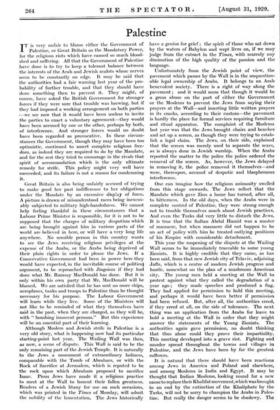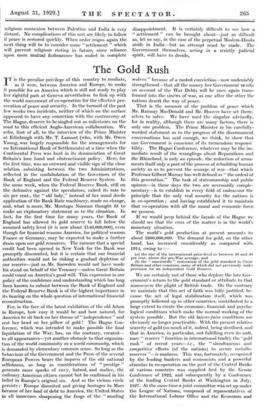Palestine
TT is very unfair to blame either the Government of Palestine, or Great Britain as the Mandatory Power, for the religious riots which have caused so much blood- shed and suffering. All that the Government of Palestine have done is to try to keep a tolerant balance between the interests of the Arab and Jewish zealots whose nerves seem to be constantly on edge. It may be said that the authorities had a fair warning last year of the pro- bability of further trouble, and that they should have done something then to prevent it. They might, of course, have asked the British Government for stronger forces if they were sure that trouble was brewing, but if they had imposed a working arrangement on both parties —we see now that it would have been useless to invite the parties to enact a voluntary agreement—they would have been accused by one or the other, perhaps by both, of interference. And stronger forces would no doubt have been regarded as provocative. In these circum- stances the Government, though they may have been too optimistic, continued to assert complete religious free- dom, as indeed they are required to do by the Mandate, and for the rest they tried to encourage in the rivals that spirit of accommodation which is the only ultimate remedy for strife. This policy might very well have succeeded, and its failure is not a reason for condemning it.
Great Britain is also being unfairly accused of trying to make good her past indifference to her obligations under the Mandate by an excessive display of force. A picture is drawn of misunderstood races being inexcus- ably subjected to military high-handedness. We cannot help feeling thankful in these circumstances that a Labour Prime Minister is responsible, for it is not to be supposed that the charges of military despotism which are being brought against him in various parts of the world are believed in here, or will have a very long life anywhere. No sensible person in this country wants to see the Jews receiving religious privileges at the expense of the Arabs, or the Arabs being deprived of their plain rights in order to please the Jews. If a Conservative Government had been in power here they would have expected, in the inevitable course of political argument, to be reproached with Jingoism if they had done what Mr. Ramsay MacDonald has done. But it is only within his own party that Mr. MacDonald will be blamed. We are satisfied that he has sent no more ships, aeroplanes, tanks and troops to Palestine than he thought necessary for his purpose. The Labour Government will learn while they live. Some of the Ministers will not like to be reminded of what they themselves have said in the past, when they are charged, as they will be, with "bombing innocent persons." But this experience will be an essential part of their learning.
Although Moslem and Jewish strife in Palestine is a very old story, what is happening now had its particular starting-point last year. The Wailing Wall was then, as now, a scene of dispute. This Wall is said to be the only remaining part of the Jewish Temple. It is naturally to the Jews a monument of extraordinary holiness, comparable with the Tomb of Abraham, or with the Rock of Sacrifice at Jerusalem, which is reputed to be the rock upon which Abraham proposed to sacrifice Isaac. Pious Jews have made it a religious practice to meet at the Wall to lament their fallen greatness. Readers of a Jewish litany for use on such occasions, which was printed in the Times of Monday, will admit the nobility of the lamentation, The Jews historically have a genius for grief ; the spirit of those who sat down by the waters of Babylon and wept lives on, if we may judge from the extract in the Times, with scarcely any diminution of the high quality of the passion and the language.
Unfortunately from the Jewish point of view, the pavement which passes by the Wall is in the unquestion- able legal ownership of Arabs. It belongs to an Arab benevolent society. There is a right of way along the pavement ; and it would seem that though it would be a gross abuse on the part of either the Government or the Moslems to prevent the Jews from saying their prayers at the Wall—and inserting little written prayers in its cracks, according to their custom—the pavement is hardly the place for formal services requiring furniture and ritual apparatus. The complaint of the Moslems last year was that the Jews brought chairs and benches and set up a screen, as though they were trying to estab- lish a legal claim. The Jews, on their side, explained that the screen was merely used to separate the sexes, as is always done in Jewish worship. When the Arabs reported the matter to the police the police ordered the removal of the screen. As, however, the Jews delayed in removing it, the police removed it themselves—and were, thereupon, accused of despotic and blasphemous interference.
One can imagine how the religious animosity swelled from this stage onwards. The Jews reflect that the Mandate which gave Zion a home has turned, after all, to bitterness. In the old days, when the Arabs were in complete control of Palestine, they were strong enough not to trouble themselves much about Jewish practices. And even the Turks did very little to disturb the Jews. It is true that the Sultan Abdul Hamid was a master of massacre, but when massacre did not happen to be an act of policy with him he treated outlying positions of his Empire with considerable detachment.
This year the reopening of the dispute at the Wailing Wall seems to be immediately traceable to some young Zionists. It is highly credible that they came, as has been said, from that new Jewish city of Telaviv, adjoining Jaffa, which is a centre of modern Jewish progress and hustle, somewhat on the plan of a mushroom American city. The young men held a meeting at the Wall to protest against what they called the degradation of a year ago ; they made speeches and produced a flag. They had applied for permission to hold this meeting, and perhaps it would have been better if permission had been refused. But, after all, the authorities erred, if they erred at ally on the side of tolerance. The next thing was an application from the Arabs for leave to hold a meeting at the Wall in order that they might answer the statements of the Young Zionists. The authorities again gave permission, no doubt thinking that thus alone could they prove their impartiality. This meeting developed into a grave riot. •Fighting and murder spread throughout the towns and villages in Palestine, and the Jews have been by far the greatest sufferers.
It is natural that there should have been reactions among Jews in America and Poland and elsewhere, and among Moslems in India and Egypt. It may be thought that Indian Moslems, looking round for a new cause to replace their Khalifat movement,which was brought to an end by the extinction of the Khaliphate by the Turks, will not be sorry to champion the Arabs in Pales-, tine. But really the danger seems to be shadowy. The religious connexion between Palestine and India is very distant. No complications of this sort are likely to follow if peace is restored quickly. When order reigns again the next thing will be to consider some "settlement" which will prevent religious rioting in future, since reliance upon mere mutual forbearance has ended in complete disappointment. It is certainly difficult to see how a " settlement " can be brought about—just as difficult as, let us say, in the case of the perpetual Moslem-Hindu strife in India—but an attempt must be made. The Government themselves, acting in a strictly judicial spirit, will have to decide.

































 Previous page
Previous page